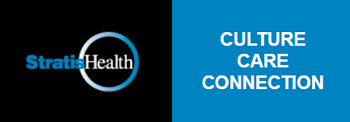- MN ABE Connect
- Archive
- Culture Care Connection
 February 24, 2020
February 24, 2020
Culture Care Connection
Wendy Sweeney, PANDA ManagerAn estimated 74,000 Somalis now live in Minnesota. Did you know that PTSD (Post-Traumatic Stress Disorder), depression and anxiety are common among Somali refugees? Did you know that many Somalis will not admit to mental health problems or seek treatment due to negative perceptions and stigma, some of which are tied to cultural norms?
 Developed by Stratis Health, a nonprofit organization, the Culture Care Connection is a wonderful online resource which offers information about various Minnesota cultures. The goal of the website is to increase cultural competence. The website states cultural competence is “having the capacity to function effectively within the context of the cultural beliefs, behaviors, and needs of consumers and their communities (office of Minority Health).”
Developed by Stratis Health, a nonprofit organization, the Culture Care Connection is a wonderful online resource which offers information about various Minnesota cultures. The goal of the website is to increase cultural competence. The website states cultural competence is “having the capacity to function effectively within the context of the cultural beliefs, behaviors, and needs of consumers and their communities (office of Minority Health).”
The website states “providers across Minnesota are providing care to an increasingly diverse patient population that may not speak English, may not be familiar with Western medical customs, and may be distrustful of the American way of delivering health care.”
ABE classes are consistently enrolling more and more students from different cultures. It may be challenging and time-consuming for teachers and volunteers to learn about the variety of countries and cultural viewpoints of the students in their classes. This is where Culture Care Connection comes in!
Here are some statistics found on the Culture Care Connection:
- Minnesota has the largest Somali population in the United States
- Minnesota’s Hmong population is second only to California, and St. Paul is home to the largest urban population of Hmong people in the world
- The numbers of African American, Asian, and Hispanic/Latino Minnesotans are expected to more than double over the next 30 years while the number of Caucasian Minnesotans is projected to fall
An example of the type of information found on the Culture Care Connection website about the Somali culture include:
- The Somali language
- Health and social disparities
- Social structure
- Health issues and diet
- Mental health beliefs
To learn more about specific cultures of students in your class, go to the Culture Care Connection website at: http://culturecareconnection.org/matters/index.html
For more information about mental health and mental health resources to share with students, visit PANDA’s website at: https://mn.abedisabilities.org/category/mental-health/
Newsletter Signup
Get MN ABE Connect—the official source for ABE events, activities, and resources!
Sign UpArticle Categories
- ABE Foundations/Staff Onboarding
- ACES/Transitions
- Adult Career Pathways
- Assessment
- CCR Standards
- Citizenship
- COVID-19
- Cultural Competency
- Digital Literacy/Northstar
- Disabilities
- Distance Learning/Education
- ELA
- Equity/Inclusion
- ESL
- HSE/Adult Diploma
- Listening
- Math/Numeracy
- Mental Health
- Minnesota ABE
- One-Room Schoolhouse/Multilevel
- Professional Development
- Program Management
- Reading
- Remote Instruction
- Science
- Social Studies
- Speaking/Conversation
- Support Services
- Teaching Strategies
- Technology
- Uncategorized
- Volunteers/Tutors
- Writing